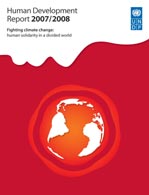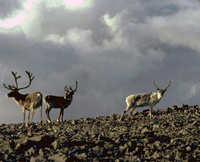
News |
- MMF to Continue Legal Struggle
- Métis Legal Victories in Saskatchewan and Ontario
- Canada's Carbon Emissions Harming World
- Environment Workers Call For Fisheries Funding
- ManitobaWildlands.org Surveys its Audience
- Canada's Environment Minister Sued Over Mine Waste
- First Nations Leader: Carbon Credits 'Belong to Us'
- No Plan for Canada's Polar Bears: Report
- US Court Throws Out Weak Mileage Standards
- 2007 Protected Areas Grade Shows Net Loss
- Withdrawal for Protection Largest Ever in Canada
- Climate, Oil Prices Fueling Food Crisis
| MMF to Continue Legal Struggle | 13 December 07 |
 On December 7th, after a 25-year court battle, Justice MacInnis' released his decision in Manitoba Métis Federation (MMF) v. A.G. of Canada and A.G. of Manitoba. On December 7th, after a 25-year court battle, Justice MacInnis' released his decision in Manitoba Métis Federation (MMF) v. A.G. of Canada and A.G. of Manitoba."We will appeal the decision," said MMF President David Chartrand. "History shows that very rarely does a lower court side with Aboriginal Peoples on a matter of importance. The Métis People will have to rely on a higher court. We would not be surprised if this went all the way to the Supreme Court of Canada." The current action has its origins in the turbulent period of 1869-1870, which led to the creation of the province of Manitoba. In 1870 the Métis were founders of Manitoba and partners in Confederation. Obligations to the Métis under sections 31 and 32 of the Manitoba Act included protection of the river lots and assurances that 1.4 million acres of land were to be reserved for the Métis children. The MMF indicates these promises were never met. "The MMF has been in court on this issue for a quarter century," explained President Chartrand. "Challenging Justice McInnis' judgment is another one of the steps we must take on our way to getting justice for the Métis People." View the December 2007 Manitoba Métis Federation press release Source: MMF |
|
| Métis Legal Victories in Saskatchewan and Ontario | 11 December 07 |
 In an October 18, 2007 decision, Saskatchewan provincial court Judge Diane Morris found Métis Donald Belhumeur of Regina not guilty of fishing without a valid license. In an October 18, 2007 decision, Saskatchewan provincial court Judge Diane Morris found Métis Donald Belhumeur of Regina not guilty of fishing without a valid license.Belhumeur was charged in 2002 by a Saskatchewan conservation officer for fishing without a licence on a lake in the Qu'Appelle Valley. Judge Morris ruled the licensing provision under The Fisheries Act was not applicable and Belhumeur, "a Métis person living in Regina who has established connections with the Qu'Appelle Valley Métis historic and contemporary community has the right to fish for food pursuant to s. 35(1) of the Constitution Act, 1982." The ruling follow a June 12, 2007 decision by Ontario Court of Justice, which ruled the harvesting agreement between Métis Nation of Ontario (MNO) and Ontario Ministry of Natural Resources (MNR) is legally binding on the Ontario Government, and that laying charges by MNR against three Métis harvesters violated terms of that agreement. The Métis are a distinct Aboriginal people with a unique culture, language and heritage, and with an ancestral Homeland in Ontario, Manitoba, Saskatchewan, Alberta, British Columbia, and the Northwest Territories, as well as northwestern United States. The Métis played an instrumental role in shaping Canada's history. View October 22, 2007 Métis National Council press release View June 12, 2007 Métis Nation of Ontario press release Sources: Métis National Council, Métis Nation of Ontario
|
|
| Canada's Carbon Emissions Harming World | 11 December 07 |
 The 2007 UN Human Development Report says climate change is harming human beings in developing nations, and chastises Canada for not doing more to curb its emissions. The 2007 UN Human Development Report says climate change is harming human beings in developing nations, and chastises Canada for not doing more to curb its emissions.The report, which describes climate change as "the defining human development issue of our generation," described Canada as "an extreme case" of not following up rhetoric with action. It noted that Canadians leave the second largest carbon footprint per capita of all nationalities after the United States, and it would require nine planets if everyone on Earth had that same footprint. The report said that in 2005, Canada's emissions had increased 27 per cent from 1990 levels and were 33 per cent above Kyoto target levels, as the country had committed to reducing emissions by six per cent by that time. This equals about 20 tons per person. The report warns about planned expansion of Alberta's tar sands to production of three million barrels per day, "greenhouse gas emissions from oil sands could increase by a factor of five to 2020, rising to over 40 per cent of national emissions by 2010." View Canada's Climate Change Impacts and Adaptation 2007 report View UNDP Human Development report View Summary of UNDP Human Development Report (PDF) View November 28, 2007 New York Times article Sources: UN Human Development
|
|
| Environment Workers Call For Fisheries Funding | 11 December 07 |
 Leger Marketing surveyed Canadians on behalf of the Union of Environment Workers (UEW), a component of the Public Service Alliance of Canada (PSAC). Results were released on World Fisheries Day to launch a campaign calling on the federal government to put more money and resources into the monitoring, enforcement and conservation of Canadian fisheries. Leger Marketing surveyed Canadians on behalf of the Union of Environment Workers (UEW), a component of the Public Service Alliance of Canada (PSAC). Results were released on World Fisheries Day to launch a campaign calling on the federal government to put more money and resources into the monitoring, enforcement and conservation of Canadian fisheries."The fisheries are obviously important to Canadians and yet staff with Fisheries and Oceans don't have the resources to protect and rebuild the stocks," said William Pynn, UEW National President. "We will not only lose a key economic sector and part of our heritage, but there will be tremendous impact on quality of life." Mr. Pynn said, "Without adequate funding, we may not have fish in our oceans and lakes in 50 years." The Union of Environment Workers represents approximately 5,700 members at Environment Canada, Fisheries & Oceans, and Natural Resources Canada. View Novmeber 21, 2007 CNW article Source: CNW
|
|
| ManitobaWildlands.org Surveys its Audience | 04 December 07 |
 This week ManitobaWildlands.org is asking its visitors, and supporters to answer the annual website survey.
Taken on line, the survey will take about 5 minutes to complete. Answers are used to inform decisions about new content, news services, and to set priorities. This week ManitobaWildlands.org is asking its visitors, and supporters to answer the annual website survey.
Taken on line, the survey will take about 5 minutes to complete. Answers are used to inform decisions about new content, news services, and to set priorities.With a 30% increase in visitors since August 2007, based on monthly statistics reports, ManitobaWildlands.org hopes its audience will participate in the survey - and help frame the future of the popular website. Take the Manitoba Wildlands Survey Source: Manitoba Wildlands
|
|
| Canada's Environment Minister Sued Over Mine Waste | 04 December 07 |
 Three environmental advocacy groups are seeking a judicial review of Canada's federal Environment Minister John Baird. Three environmental advocacy groups are seeking a judicial review of Canada's federal Environment Minister John Baird. EcoJustice filed an application late November, 2007 in Federal Court on behalf of MiningWatch Canada and Great Lakes United, alleging the government has told mining companies they needn't report millions of kilograms of pollution to the National Pollutant Release Inventory (NPRI). The notice of application filed in court alleges that Baird "has abused his discretion by communicating to mining facilities in a manner that permits them to violate the Canadian Environmental Protection Act." "The law is clear: Mining companies in Canada are legally required to report the amount of chemicals they are releasing into the environment," said Justin Duncan, Staff Lawyer with EcoJustice. "Instead, at the direction of the Minister of Environment, these companies continue to flout the law by not reporting massive amounts of toxic tailings they dump into our environment each year." Lawyers argue the Canadian mining industry's undisclosed numbers could equal as much as 50 percent of all pollutants currently reported to the national inventory, when using the U.S. industry as a benchmark. The court challenge will include a record of Baird's course of conduct, including documents providing advice and representations to the industry. View November 7, 2007 MiningWatch Canada, EcoJustice and Great Lakes United press release and backgrounder View November 9, 2007 Canadian Press article on Green Living Online View November 7, 2007 Environmental News Service article Sources: MiningWatch Canada/EcoJustice/Great Lakes United, Canadian Press, Environmental News Service
|
|
| First Nations Leader: Carbon Credits 'Belong to Us' | 04 December 07 |
 As "the landowners of British Columbia," First Nations are entitled to profits from the potential sale of carbon credits, a First Nations Summit leader says. "If there is going to be a recognition of carbon credits as a trading commodity, then we believe that those credits should belong to us, " Dave Porter told The Tyee. As "the landowners of British Columbia," First Nations are entitled to profits from the potential sale of carbon credits, a First Nations Summit leader says. "If there is going to be a recognition of carbon credits as a trading commodity, then we believe that those credits should belong to us, " Dave Porter told The Tyee.The international drive to lower greenhouse gas emissions has created a multi-billion-dollar global market for carbon credits. Although carbon trading schemes are at a very early stage in Canada, the BC provincial government is looking at ways of selling credits. First Nations believe that "in many areas the carbon credits should be recognized as an extension of First Nations jurisdiction and land ownership," said Porter, one of three members of the First Nations Summit Task Group, the political executive of the First Nations Summit. Carbon credits represent "new money," Porter said. "This is the new economy. These are dollars that could possibly flow from other parts of the globe into British Columbia." Porter said he was surprised to learn that the government plans to introduce legislation in the next few weeks that will set targets for reducing emissions in B.C. First Nations were not consulted on this legislation, he said. "We more than anybody in this province are going to feel the brunt of climate change. Because that's where we live. We live out on the oceans, we live out along the rivers and the lakes, and we populate northern British Columbia, rural British Columbia." View November 20, 2007 The Tyee article Source: The Tyee
|
|
| No Plan for Canada's Polar Bears: Report | 04 December 07 |
 Canada's polar bears are at risk of disappearing and the federal government currently has no plan to protect them amid shrinking Arctic ice conditions. Canada's polar bears are at risk of disappearing and the federal government currently has no plan to protect them amid shrinking Arctic ice conditions.A new David Suzuki Foundation report finds that polar bears are not listed federally as a species at risk. Only two of the seven Canadian provinces/territories where polar bears are found (Ontario and Newfoundland and Labrador) list the species provincially. Newfoundland and Labrador is the only province or territory to have a formal management plan in place for the polar bear. The report also concludes Canada currently has no marine protected areas in the Arctic. Four polar bear populations presently are without even a single hectare of land for denning and travel protected within their range. Five of Canada's thirteen polar bear populations show a decline in numbers. These populations, as well as others, could face continued decline in a landscape increasingly transformed by global warming. WWF Canada has created an online tool to raise awareness about polar bears and climate change. Visitors to the site follow six female polar bears with cubs in Canada's Hudson Bay region. The polar bears are part of a research project aimed at learning more about bear behavior and how they may be being affected by climate change. View November 26, 2007 David Suzuki Foundation press release View November 2007 David Suzuki Foundation report, Canada's Polar Bear: Falling through the cracks? View November 22, 2007 WWF Canada press release View WWF Canada's Polar Bear Tracker Sources: David Suzuki Foundation, WWF Canada
|
|
| US Court Throws Out Weak Mileage Standards | 04 December 07 |
 The Ninth Circuit Court of Appeals in San Francisco ruled November 15, 2007 the US government violated the law by ignoring global warming when it set national gas-mileage standards for SUVs and pickup trucks through the National Highway Traffic Safety Administration (NHTSA). The court sent the decision back to the NHTSA for a full Environmental Review of the gas-mileage standards. The Ninth Circuit Court of Appeals in San Francisco ruled November 15, 2007 the US government violated the law by ignoring global warming when it set national gas-mileage standards for SUVs and pickup trucks through the National Highway Traffic Safety Administration (NHTSA). The court sent the decision back to the NHTSA for a full Environmental Review of the gas-mileage standards.The federal appeals court ruled against the decision to exempt SUVs and light trucks from fuel-economy standards, stating the NHTSA failed to address why light trucks are allowed to pollute more than passenger cars. The court also ruled the NHTSA didn't properly assess greenhouse gas emissions when it set new minimum miles-per-gallon requirements for 2008 to 2011 models. The administration also failed to include heavier trucks driven as commuter vehicles in the new rules. Eleven states, two cities (New York City and Washington, D.C.) and four environmental groups sued the NHTSA after it announced new fuel economy standards March 2006. This is the third federal court ruling in seven months pressing regulators to take climate change into consideration as they set standards for industries that emit carbon dioxide. The US Supreme Court ruled April 2007 that the Environmental Protection Agency is obliged to regulate greenhouse gases, and a September 2007 Vermont federal district judge decision ruled California is allowed to set stronger restrictions on automotive emissions than the federal government. View November 15, 2007 Associated Press article View November 16, 2007 San Francisco Chronicle article View November 15, 2007 Sacramento Bee article View November 15, 2007 Center for Biodiversity press release View November 15, 2007 New York Times article View November 20, 2007 Los Angeles Times Opinion article Sources: Associated Press, Center for Biological Diversity, Los Angeles Times
|
|
| 2007 Protected Areas Grade Shows Net Loss | 27 November 07 |
 This year, the Protected Areas grade for Manitoba is a 'C-'. A net loss in protected lands this year is a deciding factor in the grade. The decision to keep BiPole III out of Manitoba's east side boosted the grade. This year, the Protected Areas grade for Manitoba is a 'C-'. A net loss in protected lands this year is a deciding factor in the grade. The decision to keep BiPole III out of Manitoba's east side boosted the grade.Despite many protected areas commitments in the last two years from Mr. Doer's government, little action occurred this year. As a result, since the 2006 Grade there has been a net loss in protected lands and waters, totaling 8,961 ha. "Manitoba's political leaders make lots of promises about protecting boreal lands and waters. The reality is quite different, and the lack of action on the east side worries the NRDC. Manitoba's leaders need to act," said Susan Casey-Lefkowitz, Director, Natural Resources Defense Council Canada Program. The Manitoba government continues to operate without a public plan for establishment of protected areas. A significant amount of new development is intended in forest regions where protected areas networks are not complete. Manitoba Wildlands director Gaile Whelan Enns said, "The Manitoba government has been all talk and little action over the past year, with significant protected areas commitments unfulfilled. While Little Limestone Lake has been protected, the World Heritage Site nomination is moving slowly. Calling development zones in our parks 'protected' contradicts Manitoba's Provincial Parklands Act." View Manitoba Wildlands' November 27 2007 Protected Areas Grade press release (PDF) View Manitoba Wildlands' November 27 2007 Protected Areas Grade Technical Assessment, map, and links (PDF) View Manitoba Wildlands' November 27 2007 Protected Areas Grade Map(PDF) View Manitoba Protected Areas Commitments 2005-2007 (PDF) View Manitoba Protected Areas Commitments 2005-2007 - Full Sources (PDF) View Manitoba Wildlands' November 2007 Protected Areas Audit (PDF) Source: Manitoba Wildlands |
|
| Withdrawal for Protection Largest Ever in Canada | 27 November 07 |
 The Government of Canada announced withdrawal of over 10 million hectares of boreal forest lands (25.5 million acres) from industrial development in the Mackenzie River Basin, Northwest Territories (NWT). The Government of Canada announced withdrawal of over 10 million hectares of boreal forest lands (25.5 million acres) from industrial development in the Mackenzie River Basin, Northwest Territories (NWT)."Today's announcement amounts to the largest land withdrawal for interim protection in Canadian history," said Lorne Johnson, Ottawa Bureau Director, WWF-Canada. "This is a great example of Conservation First, while we still have a chance to protect the North's lands and waters." The lands will be protected from development as management plans and final agreements are completed. Final designations will follow within the next five years. The protection will place a moratorium on new projects. There is a corridor reserved for the Mackenzie Valley pipeline. The area withdrawn around Great Slave Lake totals 8.8 million ha, and was proposed by the Akaitcho Dene. The 1.5 million ha area further north and west, adjacent to the Mackenzie River, is called "The Ramparts," because of sacred cliffs along the river. The Sahtu Dene/Metis (Khashogotiae), residents of Fort Good Hope, proposed the area for protection. WWF-Canada, Ducks Unlimited, the Canadian Parks and Wilderness Society, and the Canadian Boreal Initiative have been working with the Government of Canada and Aboriginal communities to support the community-initiated protected areas proposals. View November 21, 2007 Calgary Herald article in the Ottawa citizen View November 21, 2007 New York Times article on Boreal Songbird Initiative View information on NWT protected areas: Boreal Songbird Initiative website View November 21, 2007 WWF Canada press release View November 21, 2007 Government of Canada press release View the November 22, 2007 Canadian Boreal Initiative article Sources: Boreal Songbird Initiative, Government of Canada, WWF Canada, Calgary Herald
|
|
| Climate, Oil Prices Fueling Food Crisis | 27 November 07 |
 Prices for basic foods are soaring as a result of record oil prices, US farmers switching out of cereals to grow biofuel crops, extreme weather and growing demand from countries India and China, the UN said. Prices for basic foods are soaring as a result of record oil prices, US farmers switching out of cereals to grow biofuel crops, extreme weather and growing demand from countries India and China, the UN said.According to the UN Food and Agricultural Organization (FAO), wheat has doubled in price, maize is nearly 50% higher than a year ago and rice is 20% more expensive, says the UN. Lester Brown, founder of the Washington-based Worldwatch Institute, says US farmers distorted the world market for cereals last year by growing 20% of the whole maize crop for ethanol, taking millions of hectares of land out of food production and nearly doubling the price of maize. Growing populations, extreme weather and ecological stress, are compounding the food crisis, according to a number of recent reports. In late October, the UN Environment Programme's Global Environment Outlook report said the planet's water, land, air, plants, animals and fish stocks were all in "inexorable decline". Ali Gurkan, head of the FAO's Food Outlook programme says cereal stocks have been declining for more than a decade, but now stood at around 57 days, which made global food supplies vulnerable to an international crisis or big natural disaster such as a drought or flood. View November 3, 2007 Guardian Unlimited article View November 7, 2007 UN FAO article View November 19, 2007 Business Daily (Nairobi) article on AllAfrica.com Visit UNEP Global Environment Outlook report pages Source: Guardian Unlimited
|
|


 RSS Feeds:
RSS Feeds: